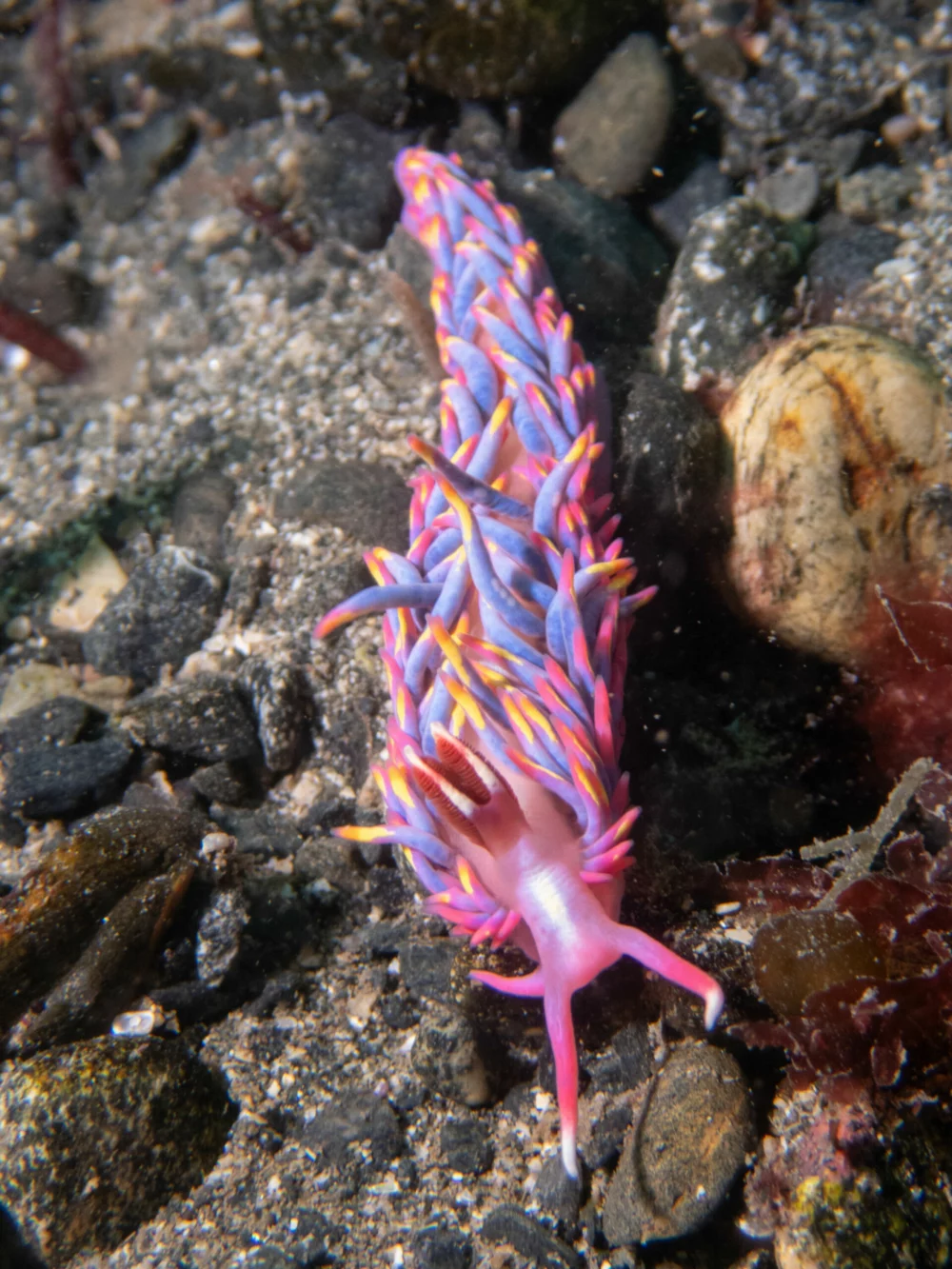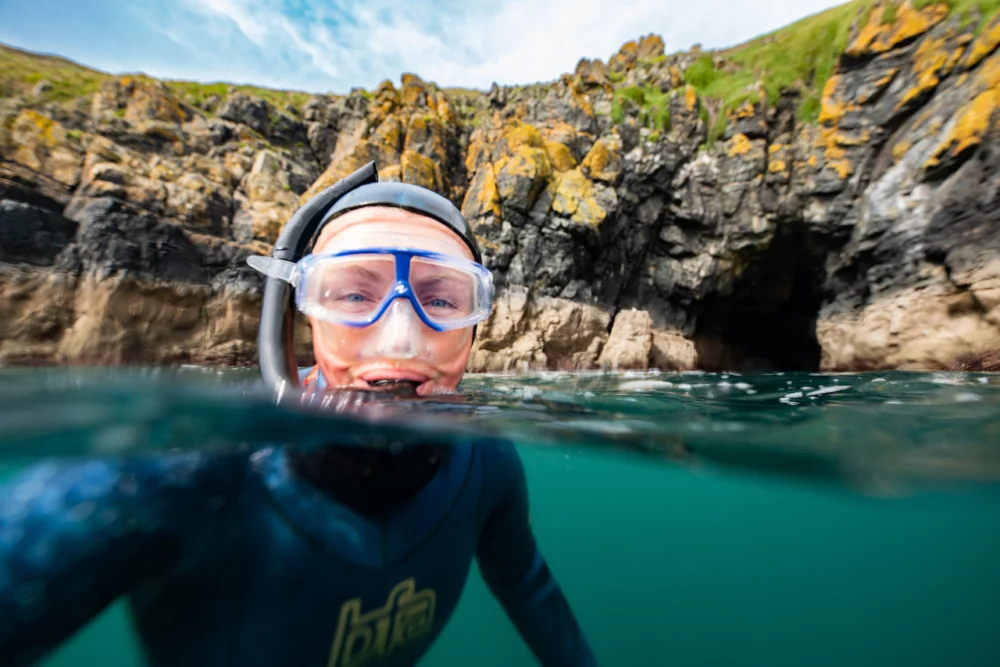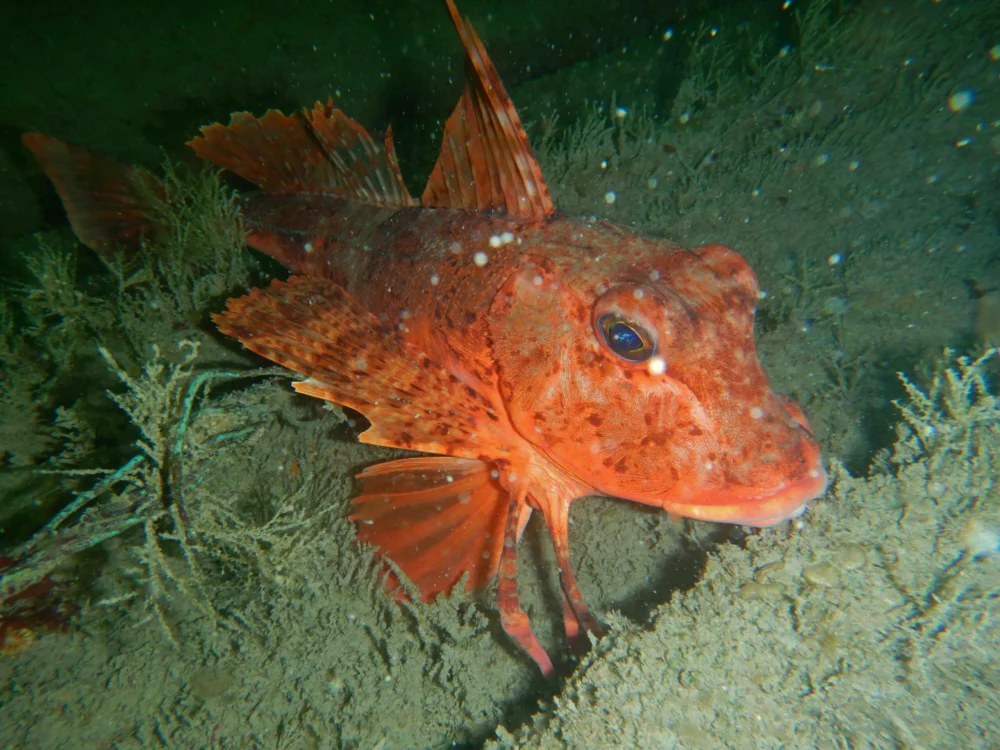- The Great Cornwall Guide
- Destinations
- Things to do
- Beach Guide
- Food & Drink
- Properties
- Journal
- Golden Lobster Reviews
- Destinations



Fancy a diving holiday? Look no further than Cornwall, says Kirstie Newton
If you’re planning your next diving holiday, why not take the plunge and come to Cornwall? You don’t have to go abroad to be able to discover breathtaking marine life or explore reefs and wrecks – it’s all here, if you know where to look.
Ask any expert, and they will tell you two things: a) that UK waters don’t have the best reputation when it comes to diving, and b) when it comes to Cornwall, that preconception is most definitely wrong.
Underwater photographer Charles Hood – author of the book 100 Best Dives in Cornwall – has been diving here for four decades, both for personal pleasure and professional purposes. “This is one of the best places to dive in the UK, by a long way,” he says.
George Miller, of Aquacity Freediving, goes further: “I can categorically say that Cornwall is one of the nicest places I have ever dived anywhere in the world, and I have been lucky enough to travel a little. The ocean here is a wilderness – it’s not always easy, but when it’s good, it is some of the best.”
So what exactly makes Cornwall so appealing to divers? How many reasons do you want?

Daan Verhoeven
This is one of Cornwall’s biggest asset to divers. “The further west, the fewer rivers there are,” says Charles. “Then at Land’s End, the English Channel meets the Irish Sea and the Gulf Stream, which churns things up with a beautiful load of fresh Atlantic water and lots of nutrients.”

Daan Verhoeven

Porthkerris Divers
Lots of nutrients means an abundance of marine life. Cornish waters are home to jewel anemones and sea fans, cuckoo wrasse and cuttlefish. You might even spot dolphins, minke and humpback whales, and magnificent basking sharks.
When Charles takes film crews out, they are frequently surprised by the quality of what they find. “They thought they had to go to the Med for this kind of diving,” he chuckles. “There’s an amazing array of animals – it’s very colourful. You might look at my photos and say that’s not the UK, but it is.”

Charles Hood
OK, this isn’t the Med, but it might not be as cold as you think. “Cornwall is rivalled only by Scotland for UK diving – and Cornwall is warmer,” says Charles. “The nature of being a peninsula is that it catches the warmer waters of the gulf stream,” adds George. Indeed, the water rarely goes below 8°C and can get as high as 20°C.

Daan Verhoeven
A good school will have not only local knowledge but also your safety at heart, along with a load of useful facilities, all in one place: dive shop, hot coffee, toilets and showers, maybe even a campsite. “You never get quite comfortable with changing in a cold, windy car park,” says George Miller, whose freediving school shares just such a site with Porthkerris Divers on the Lizard peninsula, run by Jo and Mike Anselmi.
Check your instructor is insured and certified with a recognised agency, with adequate surface support and facilities. “Don’t just go for the cheapest – they are cheap for a reason,” warns George. “Diving is super-safe when conducted properly, but it can quickly go wrong.”

Daan Verhoeven
“There is a bit of something for everyone, whether you are interested in adventure diving, poking around the lovely cracks and gullies looking for wildlife or the deeper sport of freediving,” says George. Porthkerris Divers offers options from SSI and PADI courses from beginners upwards, as well as guided dives, hardboat diving and basking/blue shark snorkeling boat trips. Novices can do a try dive either in the dive pool or from the shore, while experienced divers can join the team to explore beautiful reefs and historic wrecks – the Manacles Marine Conservation Zone is just a 10-minute boat ride away.

Porthkerris Divers
“Maybe avoid January to March, when it’s rougher and more difficult,” says Charles. “But once the season starts again, you could be diving until mid-December.” This suits Porthkerris Divers, where for 30 years Jo and Mike have run a farm alongside their beachfront diving school. “They go well together, as the diving is quieter when we are busiest on the farm, calving and lambing,” says Jo.

Daan Verhoeven
What could be more Cornish than a good shipwreck? There are a couple of interesting examples just off the coast in Whitsand Bay: liberty ship HMS James Eagan Layne was beached and sunk there in 1944, having come a cropper while carrying 4,500 tons of US Army Engineers’ equipment from Wales to Belgium; while frigate HMS Scylla was sunk there in 2004, having been acquired by the National Marine Aquarium as an artificial reef. Always seek advice, bearing in mind that wrecks require great care – get trapped inside in a storm of silt, and you could be in serious trouble. Scylla in particular is advised as a scenic dive, with no entry into the vessel itself.

Porthkerris Divers
Don’t fancy carrying all that kit? Give freediving a go – the sport of diving on a single breath. “It’s great for beginners, and very accessible – if you have ever snorkelled and dived down, you have made a start,” says George who, with a breath hold of just over seven minutes, holds six national records and has been UK national champion the past two years (her husband is world-famous freediving photographer Daan Verhoeven). “It’s much more straightforward than scuba, which has more equipment and important science to understand. Freediving is all about taking your time – the more relaxed you are, the easier it gets, and the deeper and longer you can dive.” Participants need to be able to swim comfortably and fill in a standard medical form declaring any preexisting health conditions. It’s very important to take a course with someone qualified and learn the safety procedures – and never freedive alone.
With thanks to:
Porthkerris Divers porthkerris.com
Aquacity Freediving aquacityfreediving.com
Charles Hood charleshood.com
Categories: Adrenaline Attractions & Activities, Cornwall Watersports